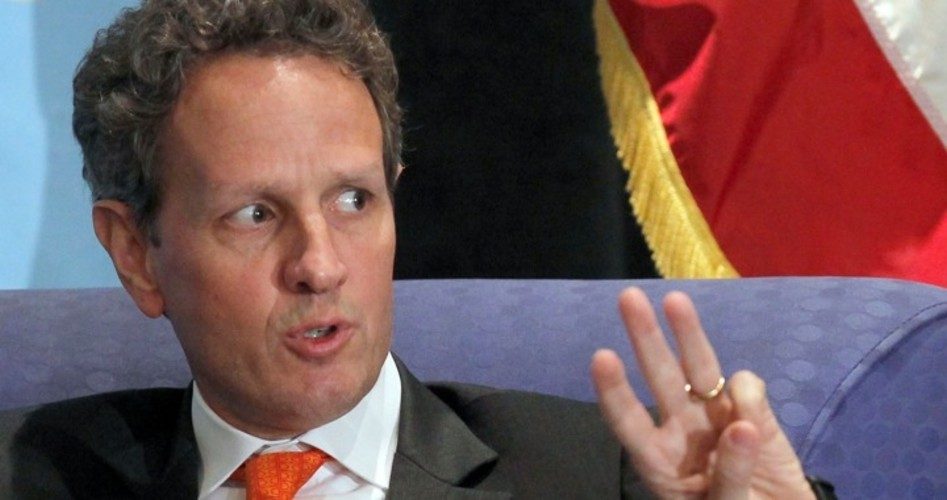
President Obama’s Treasury Secretary Timothy Geithner has embraced the “Buzz Lightyear” strategy to overcome the fiscal and debt crisis known as the “fiscal cliff”: to infinity and beyond. Geithner told host Al Hunt on Bloomberg TV’s Political Capital on November 16 (see video below) that he favors elimination of the statutory debt limit. “It would have been time a long time ago to eliminate it. The sooner the better.” The move would place no upper limit on how much Congress and the White House could spend and borrow, effectively making the Disney Toy Story character’s catch phrase national debt policy.
The so-called “fiscal cliff” — though technically separate from the national debt limit imposed by Congress — is a measure adopted by Congress that would automatically increase taxes and impose tiny spending cuts January 1, 2013. It was created in the wake of a 2011 negotiation between the White House and the Republican-controlled House of Representatives as the statutory debt limit neared. According to the Washington Post, “The fiscal cliff is the combination of federal spending cuts and tax increases that are scheduled to shrink the federal deficit to $641 billion from $1.1 trillion in the current fiscal year, a decline of $487 billion in one year. Tax increases account for $478 billion, or 98 percent, of the deficit reduction.”
And that kind of deficit reduction is not acceptable to the Obama White House, as well as to establishment economists who predict a recession if the nation drives off the fiscal cliff. The minor spending concessions by Democrats in the summer of 2011 — which avoided far larger spending cuts that would have taken place as a result of failing to increase the national debt limit — apparently still sting the Obama White House. Geithner explained to Hunt, “Well, this is something only Congress can solve. Congress put it on itself. We’ve had 100 years of experience with it, and I think only once — last summer — did people decide to use it to threaten default on the American credit for the first time in history as a tool for political advantage. And that’s not a tenable strategy.”
Disregarding the supposed accuracy of Geithner’s claims, it’s not tenable if the White House intends to continue trillion-dollar deficits into infinity. That’s for sure.
But the fiscal cliff and Republican leverage with the national debt limit have also been the means by which Republicans have found the courage to demand even small cuts in federal spending. (In reality, the House Republicans have complete control under the U.S. Constitution to cut off federal deficit spending, regardless of how the Democratic Senate and White House rant, rave, and posture about the need for compromise. No spending can take place constitutionally without explicit approval of the House of Representatives.) Free-market economists such as Euro-Pacific Capital’s Peter Schiff have pointed out that the “fiscal cliff” is really more of a fiscal speed bump, and that the tax cuts — while unwise economically — are far less dangerous to the economy than continued borrowing. Schiff told the Fox Business Channel November 15:
We need a bigger cliff, this one is actually too small. There’s not enough spending cuts. But unfortunately, the spending cuts are trivial. And in fact, they’re not really cuts. They are simply reductions in the rate of increase. Now, I don’t want to trivialize the size of the tax hikes, they’re big, and they’re going to hurt. But unfortunately, they need to be big. They need to be bigger. Because we have an enormous government. We’re spending a fortune. And if we want a huge government — if we want all this free stuff — provided to so many people, it costs money. And unfortunately, you can’t get that money just from the rich. You’ve got to get it from the middle class and the working poor…. We need tax increases on everybody if we are not going to cut spending.
If we are going to spend all this money, then yes. I think that taxes are less damaging to the economy than the deficits that replace them. But the real problem is the spending. The reason that taxes have to go up is because the government is spending so much money.
https://www.youtube.com/watch?v=dJnLyEWganE
Photo of Timothy Geithner: AP Images


